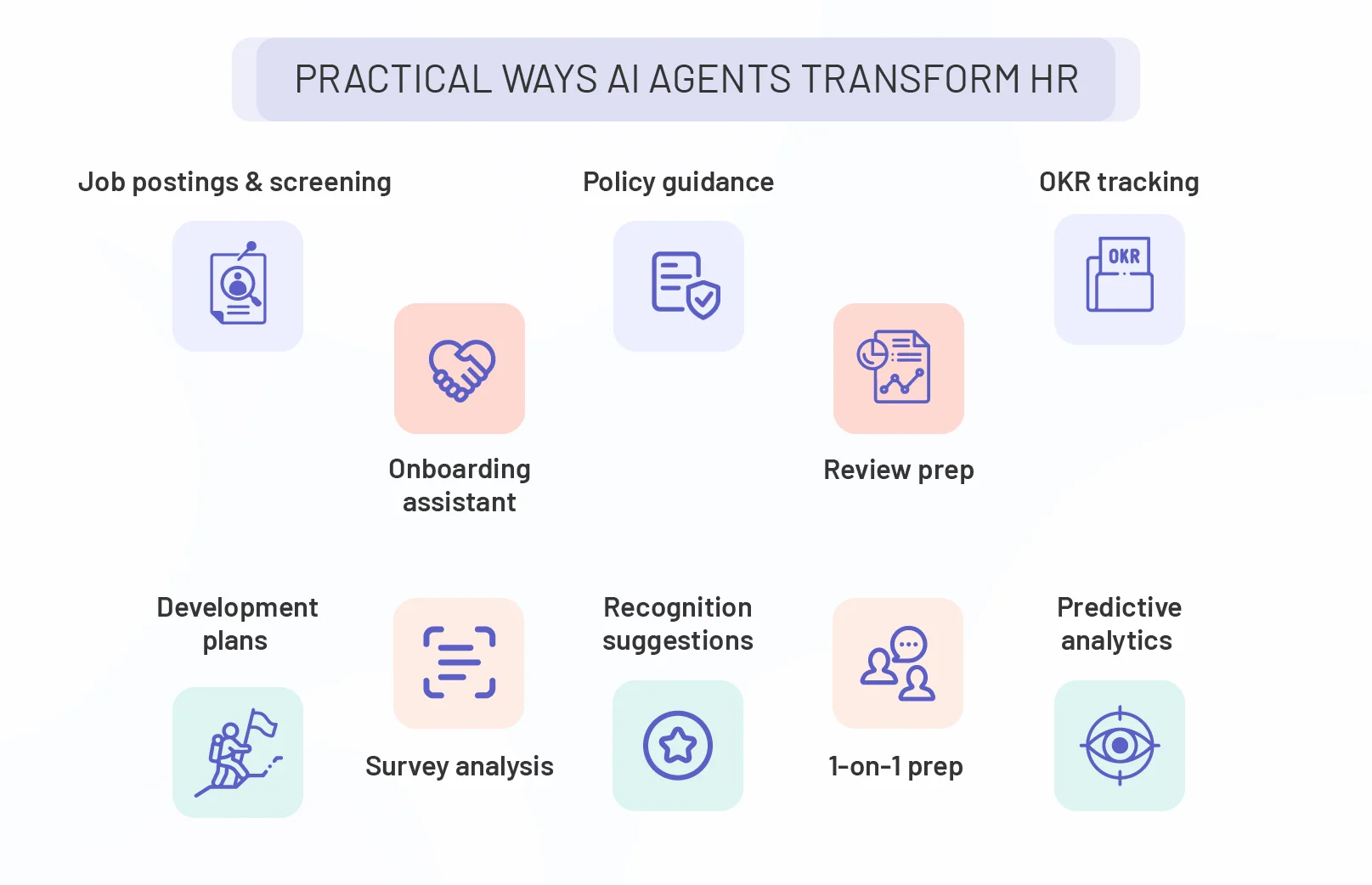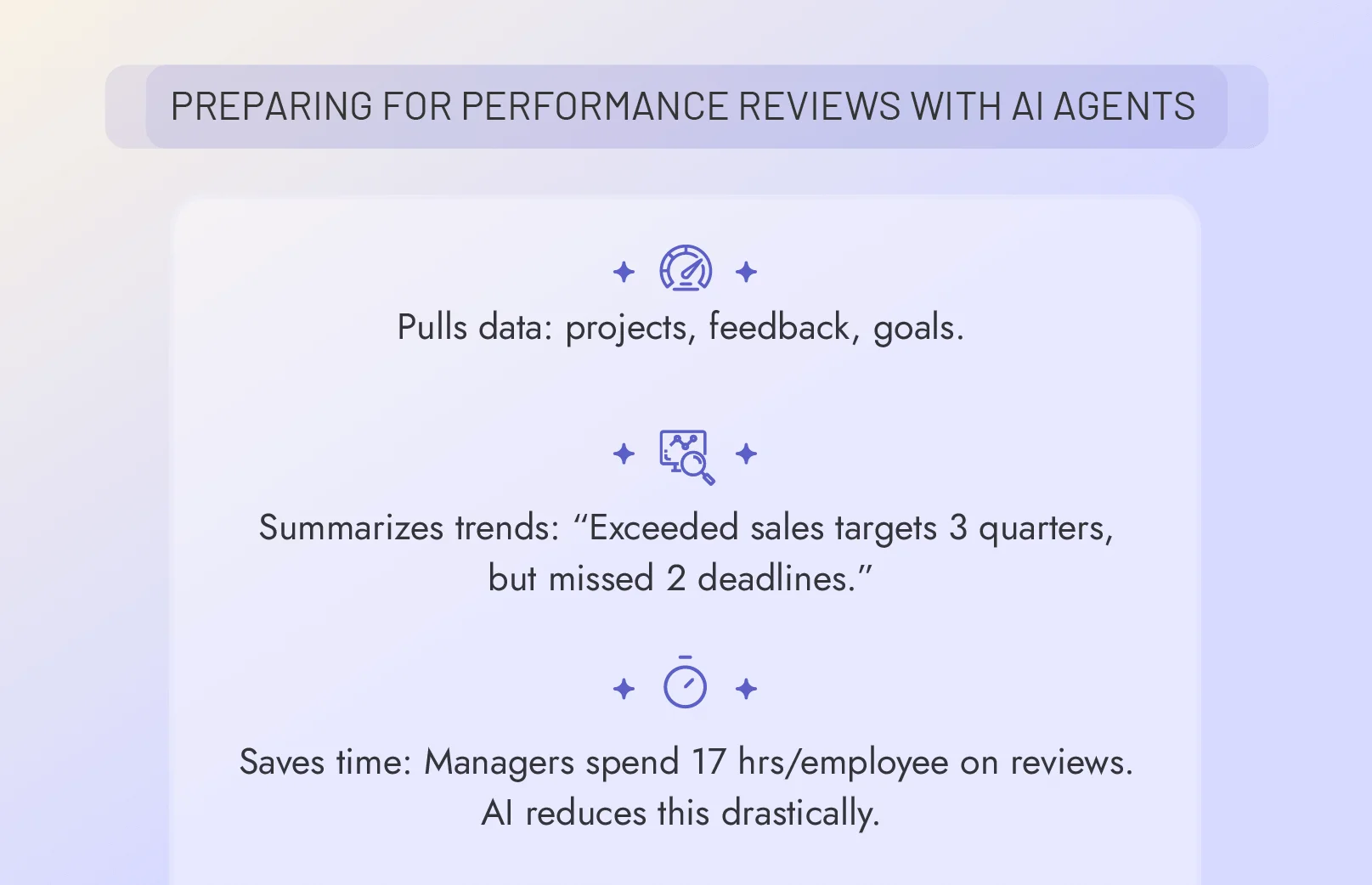AI Agents in HR: 10 Practical Use Cases
.svg)

.svg)

AI agents in HR are transforming how companies manage their workforce. Unlike basic chatbots that only answer questions, these agentic AI systems for HR can actually take action and take care of core HR functions by automating tasks, analyzing data, and making recommendations that save HR teams hours every week.
While there are plenty of articles around the use of AI for human resources departments when it comes the generative AI, AI tools, and automation overall, AI agents bring in their own unique use-cases to the world of HR.
That is why in this article we will be exploring some of the most important use-cases for AI agents in HR.
AI agents are software programs that understand context, learn from patterns, and complete tasks without constant human oversight. In HR, they can act as digital assistants that can take care of multiple different tasks, such as;
Agents are smart, AI-powered assistants for your HR team that go beyond answering "What's our vacation policy?" They can spot patterns in employee surveys, identify employee burnout signs, help prepare for performance reviews, and flag when someone hasn't updated their goals in weeks.
While the concept of automation isn't new, the shift toward AI agents in HR represents a major leap in organizational maturity. Moving beyond simple automated workflows, these agents provide a layer of intelligence that acts as a force multiplier for people operations. According to research from Gartner, approximately 80% of HR leaders believe that incorporating AI into their workflows will be a significant driver of operational excellence by 2026. This isn't just about efficiency; it's about shifting the HR paradigm from reactive to predictive.
By implementing specific use cases for AI agents in HR, your team can unlock several critical advantages:
Chatbots respond to questions. AI agents get things done.
Key Distinctions:
Automating Administrative Tasks
Josh Bersin Company research found that HR teams currently spend 41% of their time on transactional activities. AI agents handle these tasks in seconds.
This shift lets HR professionals focus on strategic work like building culture and developing talent. Another study that supports this is the McKinsey analysis which shows that 56% of typical HR tasks could be automated with current technologies.
Supporting Data-Driven Decision-Making
AI agents analyze patterns humans might miss. They track performance trends across departments, identify skills gaps before they become problems.
Enhancing the Employee Experience
Employees get instant answers without waiting for HR to respond. New hires receive personalized onboarding paths. High performers get development recommendations tailored to their career goals.
This level of convenience results in better manager-employee relationships, higher engagement, and less frustration with HR processes.

Hiring teams often lose valuable time on repetitive tasks such as:
Despite the effort, promising candidates can slip through the cracks while unqualified ones fill up the pipeline.
How AI Agents Help Recruiting:
AI agents draft job descriptions based on role requirements and company tone. They scan hundreds of resumes in minutes, ranking candidates by skills match and experience level.
Practical Actions AI Agents Can Take:
Studies suggest that new hires who experience poor onboarding are 2x more likely to leave within the first year. Taking advantage of AI-powered employee onboarding tools can help companies avoid these odds altogether.
How AI Agents Help Onboarding:
Instead of overwhelming new hires with scattered documents and repetitive HR emails, AI agents provide structured, personalized guidance. They deliver just-in-time answers (“How do I set up benefits?”), check off tasks in a digital onboarding plan, and alert managers if progress stalls.
Specific Actions
HR departments field thousands of policy-related tickets each year, often on repeat topics like PTO, travel, and expense rules. Each one takes valuable time away from strategic initiatives.
Instead of searching through 200-page employee handbooks, staff ask the AI agent directly. "Can I work from abroad for two weeks?" The agent checks company policy, local regulations, and tax implications, then provides a clear answer with next steps.
Measurable Benefits
Gartner research predicts that 70% of HR-related inquiries will be handled by chatbots by 2027. Organizations implementing AI chatbots already report significant reductions in HR ticket volume. This leaves your HR team to focus on other key responsibilities, such as people strategy.
Common Questions AI Agents Can Handle

Data Collection and Analysis
AI agents can compile data from multiple sources before performance reviews. They pull project outcomes, peer feedback, goal completion rates, and previous review notes into organized summaries.
Manager Support Features
Managers receive suggested talking points based on each employee's performance patterns. The agent might note: "Sarah exceeded her sales targets for three straight quarters but missed two project deadlines. Consider discussing time management strategies."
Time Savings
Many organizations adopt OKRs but struggle with keeping them visible. Goals are often set and forgotten about until the next review period.
AI agents can help streamline the entire OKR tracking process by monitoring progress continuously, sending reminders, and flagging at-risk objectives before reviews.
Practical Actions
Sample AI Agent Interaction
Manager prompt: “Summarize Q2 OKRs.”
Agent response: “Marketing achieved 92% of targets, but the lead-gen campaign is 30% behind. Sales is at 78%, with Q3 pipeline risk flagged.”
Employees want to grow, but career paths aren’t always obvious. Some don’t know what skills to build, others don’t see available opportunities, and managers struggle to provide personalized guidance.
How AI Agents Help Learning and Development
AI agents act as career coaches at scale. They match employees with mentors, recommend learning resources, and suggest projects that stretch their skills. Best AI agents for HR departments can analyze your company's competency frameworks for each role, skill matrices, and other key information to help employees build career development plans.
Practical Actions
Employee surveys reveal valuable insights, but only if someone takes the time to analyze them deeply. Using AI-powered employee engagement survey software can help HR departments not only conduct surveys automatically but also analyze results far more meticulously.
How AI Agents Can Help with Surveys
AI agents can continuously scan survey results and employee feedback, identifying shifts in sentiment and recurring pain points. They can then alert HR to issues before they escalate, helping leaders step in with meaningful interventions at the right time.
Practical Actions
Recognition often slips through the cracks, not because managers don’t care, but because they’re focused on deadlines and everyday responsibilities. AI agents ensure great work never goes unnoticed by tracking key metrics such as:
And more. They might prompt managers to celebrate achievments with responses such as: "Alex resolved 40% more support tickets than average this month. Consider highlighting this in the team meeting."
How AI Agents Can Help with Recognition
One-on-one meetings are among the most valuable tools a manager has, yet they often lack preparation. Without proper context, conversations default to task updates instead of meaningful coaching or development discussions. Employees may leave feeling unheard, and managers miss opportunities to guide careers and resolve issues.
How AI Agents Help
AI agents gather everything managers need before a meeting such as:
And present them as a clear, digestible summary. This preparation allows managers to walk into 1-on-1s focused on support and growth rather than scrambling for information.
Practical Actions
One thing HR departments can't afford to do in 2026 is to operate reactively. They can't address turnover or skill shortages only after they become pressing problems. Addressing these issues after-the-fact can cause organizations to lose key talent, endure leadership gaps, or create an overall negative employee experience.
How AI Agents Help with Workforce Analytics
AI agents give HR leaders the ability to look ahead instead of constantly playing catch-up. They study workforce patterns over time, including engagement trends, career paths within the organization, and more. They can then highlight where risks or gaps are likely to emerge. With these insights in hand, HR can prepare retention strategies and strengthen succession pipelines.
Practical Actions
We sit down with Microsoft MVP Mark Smith to explore how AI becomes an extension of the person, not a search box. From “AI as a sparring partner” to agentic workflows, Mark shows why outcomes improve when you codify how you work, train on your own data, and let agents carry the load.
An all-in-one performance management tool for Microsoft Teams
